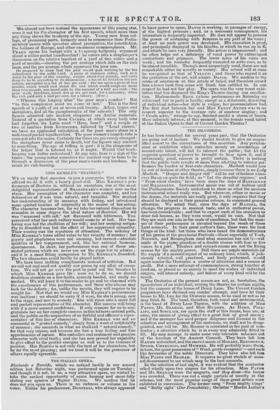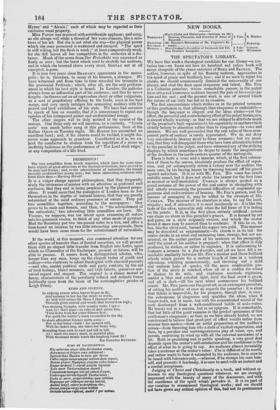THE ORATORIOS.
IT has been remarked for several years past, that the Oratorios are going out of fashion. We should hesitate to give an unqua- lified assent to the correctness of this assertion. Any perform- ance or exhibition which embodies merely an assemblage of second-rate talent, will fail to interest the public ; but let the requisite quantum of power be brought to bear upon it, and if intrinsically good, success is pretty certain. There is nothing that the public taste revolts at more than allotting; to inferior per. formers the burden of first-rate characters. Macbeth would now be out of fashion at either theatre, simply because there is no Lady Macbeth. "Deeper and deeper still" will be out of fashion when- ever BRAH AM quits the field; as" Let the dreadful engines," and "From silent shades," have been since the days of BARTLEMAN and BILLINGTON. Instrumental music was out of fashion until the Philharmonic Society undertook to show us what the modern instrumental school really was. But wherever, either in music or the drama, the materials are really good, it only requires that they should be displayed in their genuine colours, to command general attention. We admit that, since the days of HANDEL, the change, the progress in musical taste, and in orchestral power, has been considerable ; and that to expect each of his oratorios to draw full houses, as they were wont, would be vain. Not that they are sunk one iota in the scale of excellence, but that the man- ner of their performance is elevated beyond the reach of these Lent concerts. In their great author's time, these were the best things of the kind: but those who have heard the demonstrations of his genius at the provincial Festivals—those especially of York, Norwich, and Birmingham (and what musician has not ?)—will smile at the pigmy grandeur of a double chorus with four or five voices to a part. Theatres and concert-rooms are not the fitting arenas for his mighty power. Still there are ample materials for the supply of a musical repast of no ordinary kind, which, if judi- ciously selected, well practised, and finely performed, would again render the Oratorios a centre of attraction and a source of profit. But a mere mélange of commonplaces, strung together at random, or placed so as merely to meet the wishes of individual singers, will interest nobody, and failure of every kind will be the result.
The Oratorios of the present season are not, as heretofore, the speculation of an individual, renting the theatre for certain nights, but the concern of the lessee of Drury Lane. The Covent Garden proprietors have declined any similar attempt, and have let their house to Mr. LEE for the Oratorio season, to be used or not as he may think fit. The band, therefore, both vocal and instrumental, is the band of Drury Lane Theatre, with the addition of Miss PATON, MT. BRAHAM, and Miss HUGHES. As HORN, PHIL- LIPS, and SINCLAIR, are upon the staff of this house, here are, at once, the means of giving effect to a great deal of good music ; and if' the manager has used proper diligence and forecast in the selection and arrangement of his materials, we shall not be disap- pointed, nor will he. Mr. BISHOP is reinstated in his post of con- ductor; a situation which he is in every way admirably fitted to fill. He may manage to make some very tolerable schemes out of the leavings of the Ancient Concert. They have left him HAYDN untouched, and the sacred music of MOZART, BEETHOVEN, SPOHR, CHERUBINI, and HUMMEL. He will probably leave them, in turn, the quiet possession of" Wind, gentle evergreen"--and such like favourites of the noble Directors. They have also left him Miss PATON and BRAHAM. It requires no great stretch of musi- cal discernment to see which may be the best concerts. In the selection of last night, it was evident that the conductor relied wholly upon two singers for his attraction. Miss PATON and Mr. BRAHAM were the magnets, and they drew—the house was crowded. There was not a single particle of novelty in the scheme, but the most popular songs of these great artists were exhibited in succession. The former sung "From mighty kings" and "Softly sighs" (Der Freischiitz); the latter "Martin Luther's Hymn" and "Alexis ;" each of which may be regarded as their exclusive vocal property. Miss PATON was received with considerable applause ; and sung, as she always will while a thread of her voice remains, like a mis- tress of her art. But she is not what she was—the physical power which she once possessed is weakened and decayed. "The spirit is still willing, but the flesh is weak ;" at least comparatively weak, for she still leaves all her competitors in the orchestra at a dis- tance. Much of the scena from Der Freischiitz was expressed as finely as ever ; but the burst which used to electrify her auditors, and in which she towered above every rival, SONTAG not at all excepted, is gone. It is now two years since BRAHAM'S appearance in the metro- polis; he is, therefore, to many of his hearers, a stranger. We have witnessed and from time to time recorded his triumphs in the provincial Festivals ; which, after all, are the only perform- ances in which his best style is heard. In London, the galleries always form an influential part of his audience ; and this he never forgets--he throws out an ad captandum shout or other vulgarism, as a sort of propitiatory offering to the Gods, even in his best songs, and very rarely indulges his remaining auditors with the purest and best exhibitions of his style. We have had occasion to speak of him so recently, that it is unnecessary to repeat our opinion of his unimpaired power and undiminished energy. The other singers will be duly noticed in the course of the season. One thing only we will mention, as a curiosity. " Cruda sane" was much better sung at this performance, than at the Italian Opera on Tuesday night. Mr. BISHOP has assembled an excellent band ; and, if his chorus could be trebled, it might dis- cover some approach to grandeur. Constituted as it is, we ex- hort the conductor to abstain from the repetition of a scene so ineffably ludicrous as the performance of" The Lord shall reign," or any composition of a like kind.



























 Previous page
Previous page